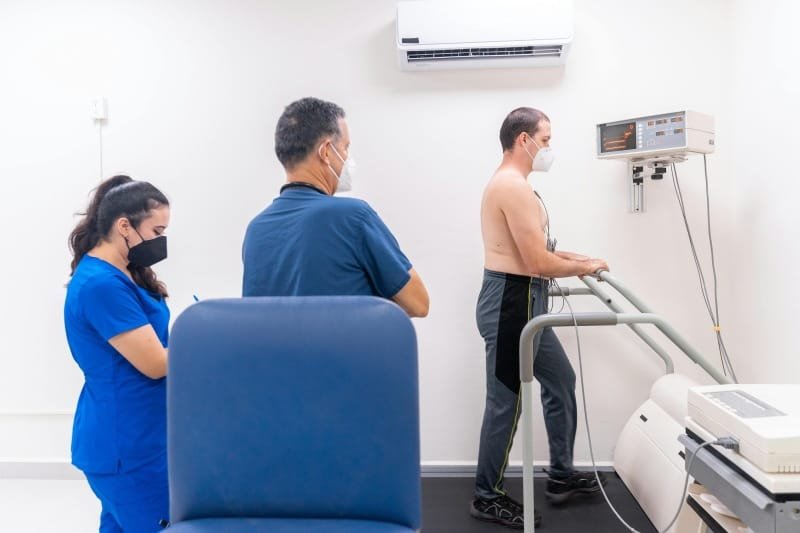Effective weight loss can be a challenging journey, but with the right tools and support, it becomes more achievable. Primary care settings provide a comprehensive approach to weight loss, focusing on personalized strategies that promote sustainable results.
At Health Express Weight Loss Clinics in Lewisville, TX, we offer a range of tools for successful weight loss in primary care, helping our patients adopt healthier habits and achieve long-term health goals.
Primary care physicians are uniquely positioned to guide patients on their weight loss journeys, offering resources and medical insights that can make a significant difference in outcomes.
Tools for Successful Weight Loss in Primary Care
1. Personalized Weight Loss Plans
- Individualized Approach: Weight loss isn’t one-size-fits-all; a successful plan is tailored to each patient’s unique lifestyle, preferences, and medical history.
- Goal Setting: Setting realistic, measurable goals, such as losing 1-2 pounds per week, keeps patients motivated and focused on their progress.
- Health Assessment: In primary care, physicians assess weight-related health risks like diabetes, high blood pressure, and cholesterol levels to create a safe, effective weight loss strategy.
2. Nutritional Guidance and Diet Planning
- Balanced Nutrition: Patients benefit from guidance on balanced meals that include lean proteins, whole grains, fruits, and vegetables, supporting weight loss without sacrificing essential nutrients.
- Portion Control: Teaching patients about portion control helps prevent overeating and promotes mindful eating.
- Reducing Processed Foods: Primary care providers encourage patients to limit processed foods and added sugars, which contribute to weight gain and health risks.
- Meal Planning: Structured meal planning can simplify healthy eating, making it easier for patients to stick to their diet goals.
3. Physical Activity and Exercise Routines
- Starting Small: Primary care physicians help patients find realistic starting points for physical activity, such as walking or light exercise, especially if they are new to exercise.
- Personalized Exercise Plans: Tailored exercise routines that include both cardio and strength training are more likely to support sustainable weight loss.
- Encouraging Daily Movement: Simple activities like taking the stairs, walking during breaks, or stretching regularly are effective ways to incorporate movement into daily life.
- Tracking Progress: Encouraging patients to track their activity helps them stay motivated and allows primary care providers to adjust recommendations based on progress.
4. Behavioral Counseling and Support
- Addressing Emotional Eating: Behavioral counseling can help patients identify and address emotional triggers that lead to overeating or unhealthy food choices.
- Building Healthy Habits: Establishing habits like mindful eating and regular meal times supports a healthier relationship with food.
- Motivational Interviewing: Primary care providers use motivational interviewing techniques to help patients set achievable goals and maintain commitment to their weight loss journey.
- Stress Management: Since stress is often linked to weight gain, incorporating stress-relief practices like meditation, journaling, or hobbies can aid in weight management.

Medical Tools for Weight Loss in Primary Care
1. Prescription Weight-Loss Medications
- When Medication Is Needed: Prescription medications are an option for patients with a BMI of 30 or higher, or 27 with a related health condition, who have struggled with lifestyle changes alone.
- Options Available: Common options include phentermine, liraglutide, and orlistat, each of which works differently to aid weight loss.
- Supervision: Primary care physicians monitor the effects of these medications, adjusting dosages or changing prescriptions as necessary for safety and effectiveness.
- Supporting Lifestyle Changes: Weight-loss medications are most effective when used alongside diet and exercise, not as standalone treatments.
2. Behavioral Therapy and Cognitive Techniques
- Cognitive Behavioral Therapy (CBT): CBT helps patients identify negative thought patterns and behaviors associated with food and body image, creating more positive approaches to weight management.
- Mindfulness-Based Eating: Teaching mindfulness during meals helps patients recognize hunger and fullness cues, improving control over eating habits.
- Self-Monitoring: Primary care providers encourage patients to log meals, activity, and emotions, helping them identify patterns and triggers that may impact their progress.
- Building Accountability: Having regular check-ins with a primary care provider or support group keeps patients accountable to their goals and provides encouragement.
3. Use of Technology for Tracking and Monitoring
- Wearable Devices: Fitness trackers or smartwatches help patients monitor physical activity, heart rate, and calories burned, promoting an active lifestyle.
- Mobile Apps for Diet and Exercise: Apps that track food intake and exercise can provide valuable insights, allowing patients to stay consistent with their diet and fitness goals.
- Telemedicine Support: Virtual check-ins make it easier for patients to access support from their primary care provider, especially if they need frequent adjustments to their plan.
- Remote Monitoring: For patients with health risks like hypertension or diabetes, remote monitoring devices track vital signs, allowing providers to adjust weight loss plans in real-time.
4. Weight-Loss Support Groups and Community Resources
- Support Group Benefits: Participating in weight-loss support groups provides patients with a community of peers, promoting accountability and shared motivation.
- Local Resources: Primary care providers can connect patients with local resources such as exercise classes, healthy cooking workshops, and community wellness programs.
- Online Support Communities: Virtual support groups and forums offer an additional source of motivation and advice, particularly for those who may feel isolated in their journey.
- Educational Workshops: Health Express Clinics can offer workshops on topics like meal planning, portion control, and stress management to enhance patient understanding and skills.

Long-Term Strategies for Weight Loss Success
1. Sustainable Lifestyle Changes
- Gradual Adjustments: Making small, consistent changes is more sustainable than drastic dieting or extreme exercise, reducing the likelihood of rebound weight gain.
- Building New Habits: Primary care providers encourage patients to focus on habits that fit naturally into their lifestyle, making weight loss more achievable.
- Regular Health Check-Ins: Periodic visits to Health Express Clinics allow for adjustments to the weight loss plan, keeping patients on track and motivated.
- Celebrating Progress: Recognizing and celebrating small victories keeps patients motivated and reinforces their commitment to long-term weight management.
2. Focus on Mental Health
- Mind-Body Connection: Mental health plays a significant role in weight management, making it essential to address stress, self-esteem, and emotional well-being.
- Therapeutic Support: Counseling services help patients navigate emotional challenges related to weight loss, creating a positive mindset for change.
- Avoiding Negative Self-Talk: Primary care providers guide patients toward positive reinforcement, helping them stay focused on their health goals.
- Creating a Supportive Environment: Encouraging patients to involve family or friends in their journey can build a supportive network, making healthy choices easier to maintain.

H2 Header: Consulting Health Express Clinics in Lewisville, TX, for Weight-Loss Support
- Personalized Care: At Health Express Clinics, we provide personalized weight management plans, including guidance on prescription medications for those who qualify.
- Ongoing Monitoring: Our team offers ongoing monitoring and support to ensure safe and effective weight loss, focusing on long-term health.
- Holistic Approach: We incorporate lifestyle modifications, behavioral support, and medical interventions to help patients achieve sustainable weight loss.
Prescription medications can be a helpful tool in the journey to overcome overweight and obesity, particularly for individuals who have not achieved results with lifestyle changes alone. These medications should be used with professional guidance and combined with healthy habits for the best outcomes. At Health Express Clinics in Lewisville, TX, we are here to support patients with comprehensive weight-loss strategies, including medication options, lifestyle guidance, and ongoing care to promote lasting health.

Focus on preventative care, weight loss management, and personalized treatment, Health Express Clinics is the ideal choice for families seeking a trusted primary care provider.
Visit Health Express Clinics – Weight Loss Treatments for more details.

